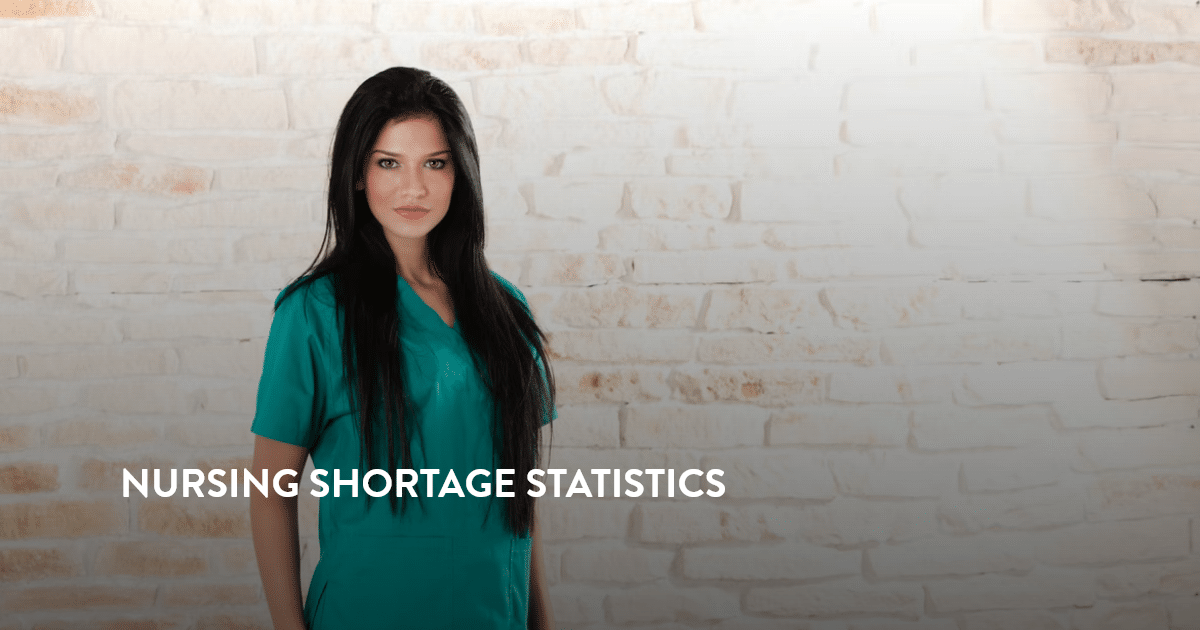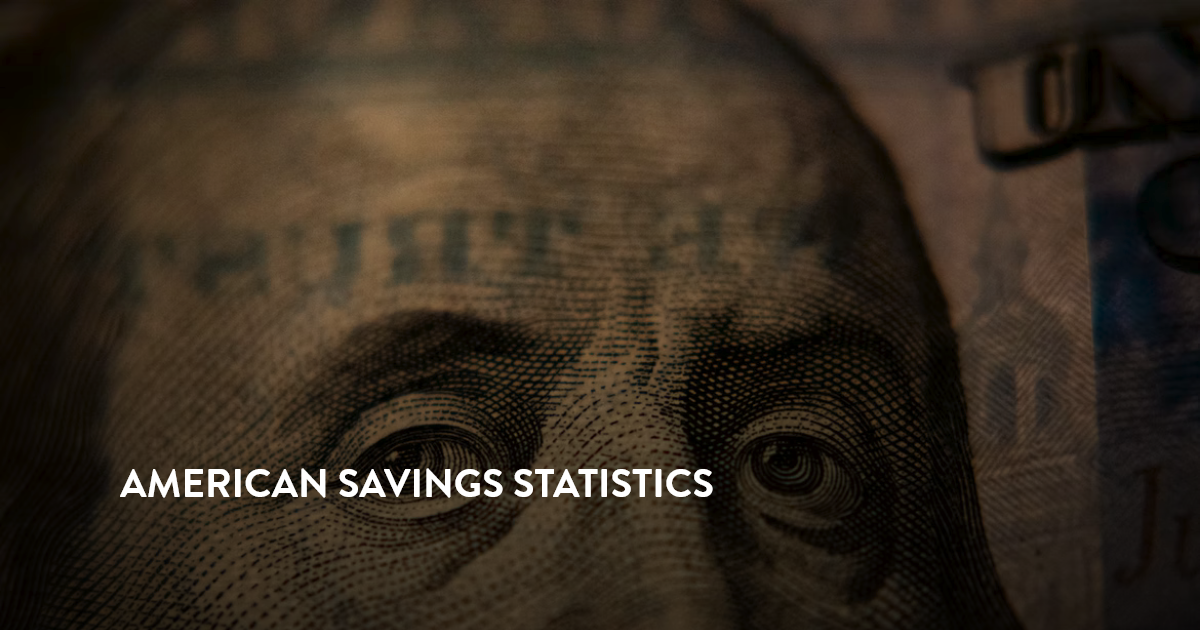- Business Statistics
- Startup Statistics
- Cloud Adoption Statistics
- Customer Loyalty Statistics
- Nonprofit Statistics
- Affiliate Marketing Statistics
- Cart Abandonment Rate Statistics
- Ridesharing Statistics
- Call Center Statistics
- eLearning statistics
- Customer Service Statistics
- Customer Experience statistics
- Entrepreneur Statistics
- Outsourcing Statistics
- Gross Revenue for Marketing and Advertising
- Sales Statistics
- MBA Statistics
- Average Small Business Revenue + Profit Margin
- How Much Do Employee Benefits Cost?
Find a Job You Really Want In
Research Summary: Otherwise known as a Master of Business Administration, an MBA is the most popular online degree. People in the US and around the world choose to pursue this postgraduate path for many reasons, including interests in marketing, management, finance, and more.
To learn more about the pros and cons of an MBA, we’ve gathered all of the latest statistics. According to our extensive research:
-
The average annual salary of an MBA graduate in the US is $115,000.
-
The average cost of an MBA is $61,800.
-
The average age of incoming MBA students is 28 years old.
-
Stanford University has the lowest MBA acceptance rate of only 6.2%.
For further analysis, we broke down the data in the following ways:
Salary | Cost | Age | Admissions
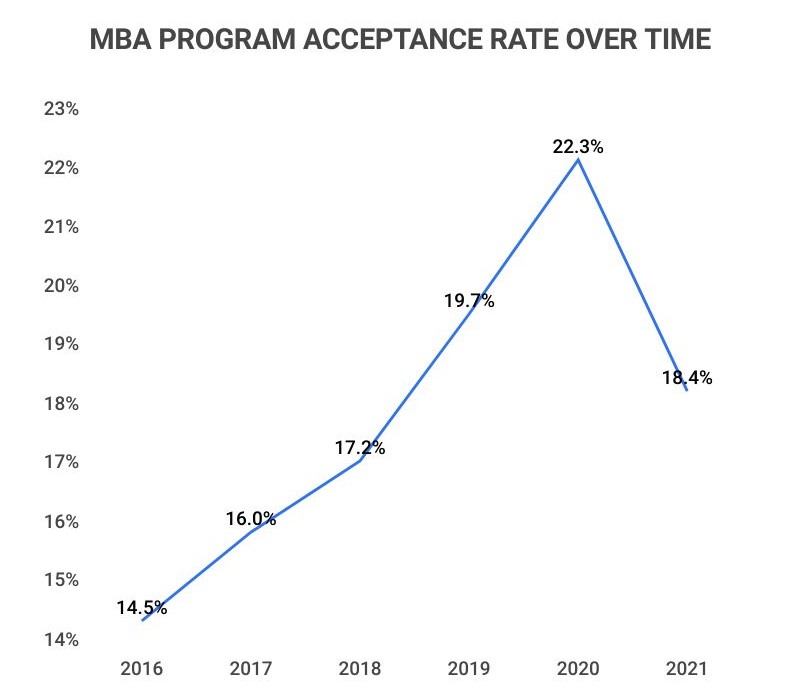
MBA Salary Statistics
Many students pursue an MBA in the hopes of earning a high annual salary. This is true in the majority of cases, as MBAs are highly versatile degrees that can help graduates get into many high-paying careers. Here are the facts:
-
The average starting salary for an MBA graduate is over $105,000.
This average includes bonuses, with the base salary of new graduates starting at an average of $95,370.
-
The Consulting industry has the highest MBA starting salary of $147,178.
While on the other hand, working in Government has the lowest average starting salary of $87,675.
Average MBA Starting Salary By Industry
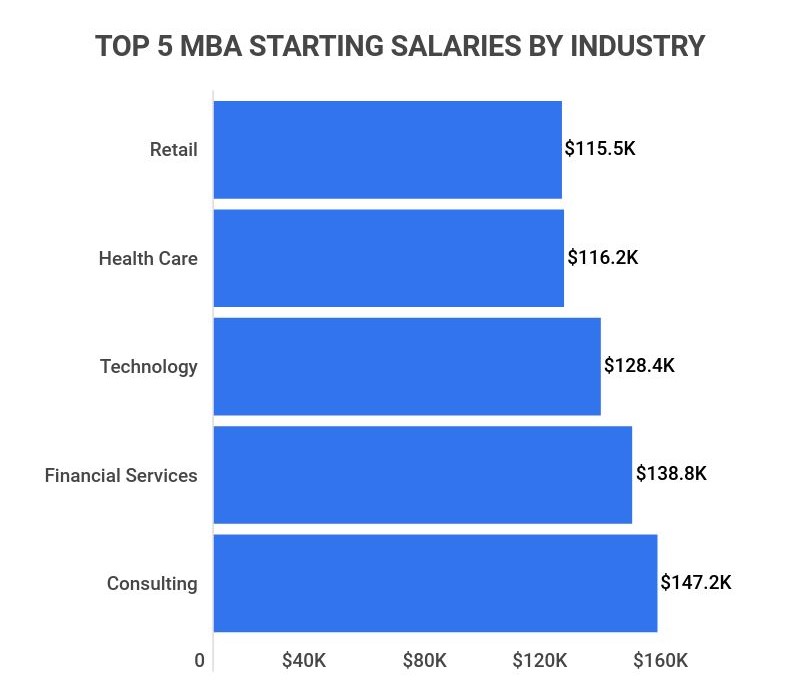
Industry Average starting salary Consulting $147,178 Financial Services $138,834 Technology $128,442 Health Care $116,250 Retail $115,485 Media/Entertainment $114,706 Energy $111,080 Consumer Packaged Goods $109,556 Real Estate $108,831 Manufacturing $108,364 Transportation $92,316 Nonprofit $90,381 Government $87,675 -
Consulting also has the highest increase in salary from earning an MBA, at +$46,414.
Those who worked in consulting prior to earning their MBA can expect a massive salary increase of $46,414. Other industries with high salary increases include:
Top 5 Industries By Average MBA Salary Increase
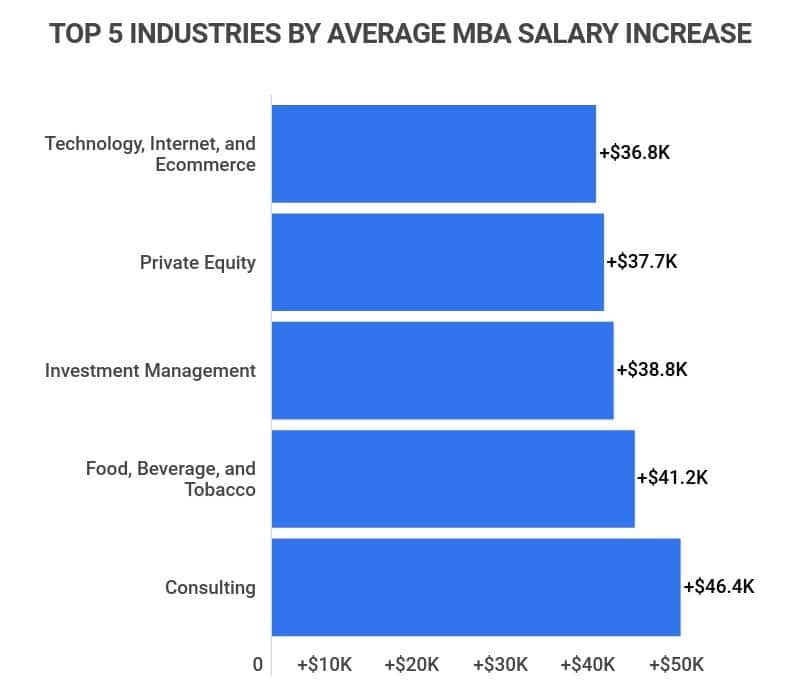
Industry Average salary increase Consulting +$46,414 Food, Beverage, and Tobacco +$41,249 Investment Management +$38,844 Private Equity +$37,739 Technology, Internet, and Ecommerce +$36,763 -
The Law industry has the lowest increase in salary from earning an MBA, at only +$8,138.
While this is certainly better than nothing, the fact that an MBA costs an average of $61,800 makes this a pretty poor investment. Other industries with low salary increases are:
Bottom 5 Industries By Average MBA Salary Increase
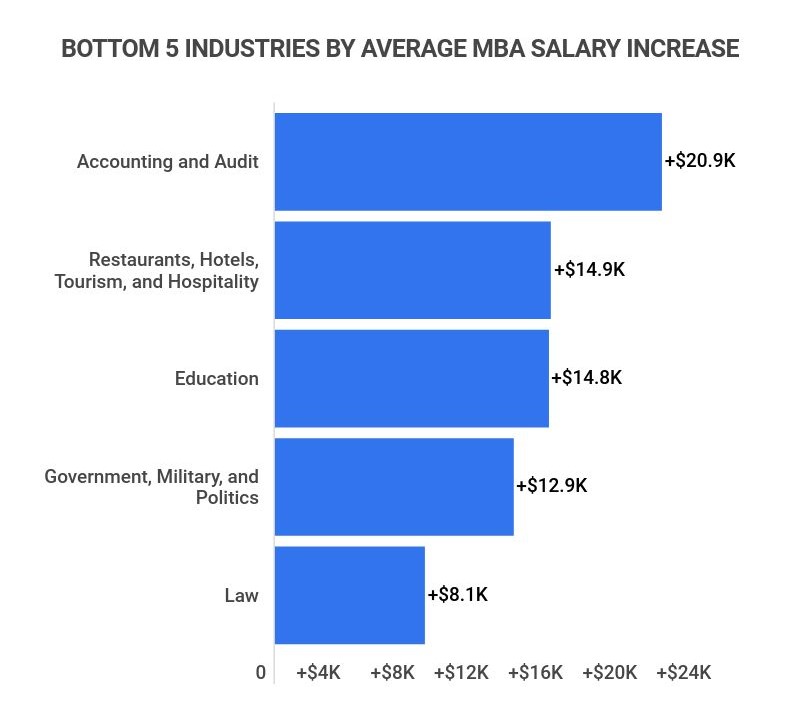
Industry Average salary increase Accounting and Audit +$20,994 Restaurants, Hotels, Tourism, and Hospitality +$14,982 Education +$14,826 Government, Military, and Politics +$12,985 Law +$8,138 -
New York University (Stern) has the highest MBA starting salary of $181,803.
The school you choose to go to, or are able to get into, can be a decisive factor in determining your MBA starting salary. The top five schools that lead to the highest MBA starting salaries include:
Top 5 Schools By Average MBA Starting Salary
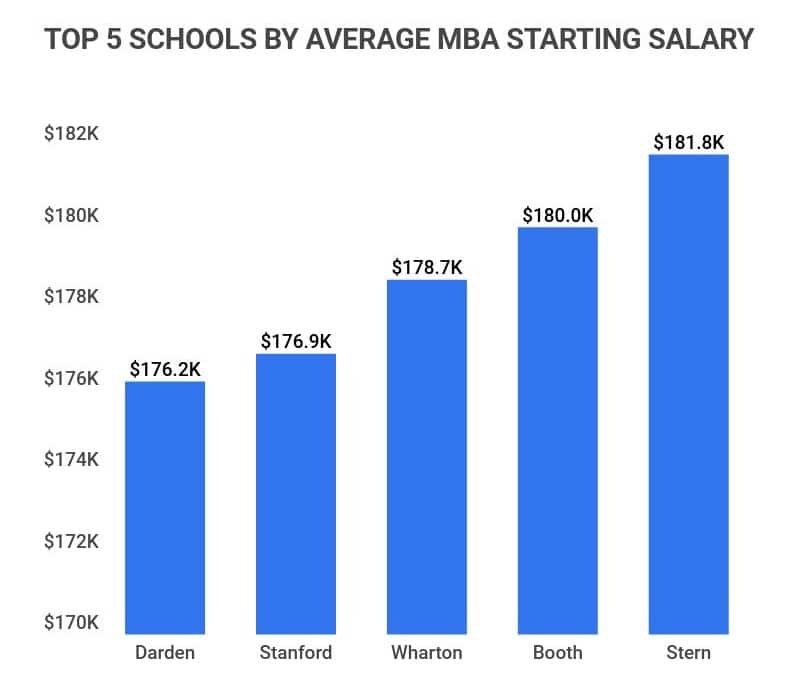
School Average starting salary New York University (Stern) $181,803 University of Chicago (Booth) $180,044 University of Pennsylvania (Wharton) $178,692 Stanford University $176,956 University of Virginia (Darden) $176,167 -
Male MBA graduates make an average of 20% more than female graduates.
Men with an MBA degree make an average of $180,000 annually, while women with the degree make an average of $150,000 annually. While the overall averages change based on years of experience, men still consistently make more than women.
Male Vs. Female MBA Salaries Over Time
Years of experience Men Women 0-2 $144,956 $133,511 3-5 $172,469 $151,951 6-8 $194,460 $174,387 9+ $241,607 $179,159
Choose From 10+ Customizable Resume templates
Zippia allows you to choose from different easy-to-use resume templates, and provides you with expert advice. Using the templates, you can rest assured that the structure and format of your resume is top notch. Choose a template with the colors, fonts & text sizes that are appropriate for your industry.
MBA Cost Statistics
Considering the cost is often the largest factor in deciding whether or not you want to pursue an MBA. To help you decide, here are some general MBA cost statistics:
-
The average cost of an MBA is $61,800.
However, this can vary wildly from student to student, depending on the school, amount of financial aid, and more. Realistically, an MBA can cost anywhere from $30,000 to over $200,000.
-
Private school MBAs can cost up to 10x more than public school MBAs
Some public and online MBA schools offer MBAs for as little as $10,000-$20,000, while those who attend private schools (especially Ivy League schools) can expect to pay anywhere from $100,000 to over $200,000.
-
MIT Sloan offers the most expensive MBA program in the US at an astonishing $241,984.
That could almost buy you a house in 2023, but MIT Sloan also isn’t alone in charging high prices. Other institutions with the most expensive MBA programs include:
Top 5 Most Expensive Schools For MBA Programs
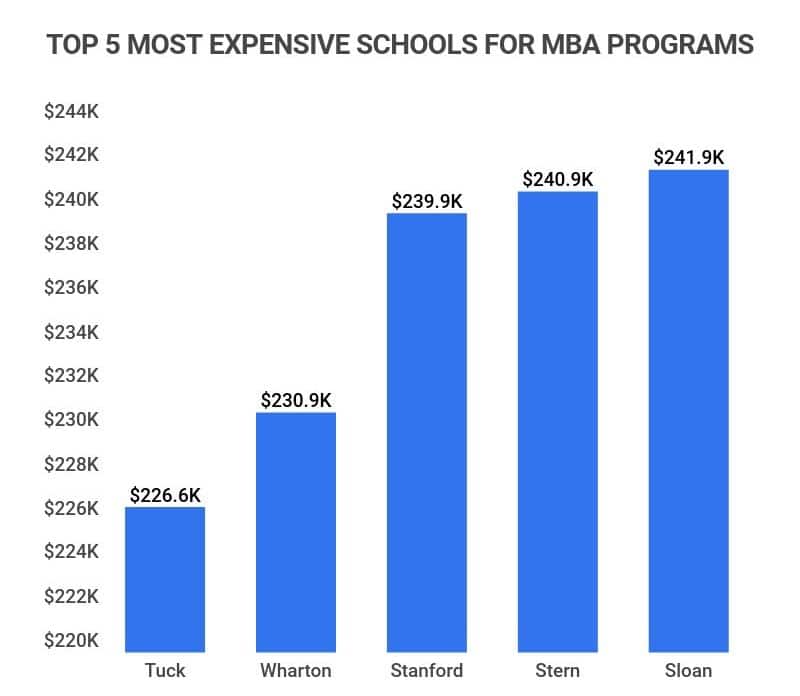
School Average MBA program cost MIT (Sloan) $241,984 New York University (Stern) $240,945 Stanford University $239,928 University of Pennsylvania (Wharton) $230,864 Dartmouth College (Tuck) $226,620 -
Cameron University has the cheapest online MBA program, costing only $4,590.
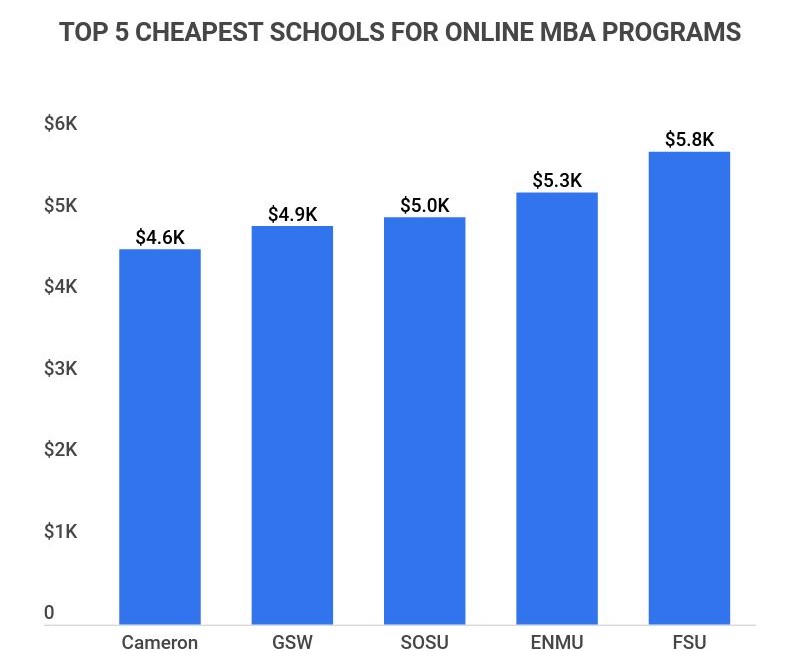
Online MBA programs, especially those offered by public schools, are by far the cheapest options available. Other among the top five cheapest include:
Top 5 Cheapest Schools For Online MBA Programs
School Average MBA program cost Cameron University $4,590 Georgia Southwestern State University $4,892 Southeastern Oklahoma State University $5,040 Eastern New Mexico University $5,351 Fayetteville State University $5,835 -
The average MBA graduate has $75,000 in debt.
Similarly to the cost of the MBA, the average debt can also vary greatly between students. Debt from MBA programs in the US tends to fall anywhere between $10,000 to $222,000.
-
The average MBA textbooks cost between $1,000-$4,000.
This is considerably more than the average for postgraduate students in general, which is between $628 and $1,471.
-
Online MBA programs cost an average of 25% less than on-campus programs.
The average cost of an online MBA program is $4,660, making it cheaper than any other option.
-
68% of MBAs are sponsored by a company.
Many companies have a vested interest in ensuring their employees become more effective in the workplace. Sometimes, this even includes sponsoring their employee’s education.
MBA Age Statistics
Students can attend MBA programs and achieve a degree at any age, but there are important averages to examine. For example:
-
The average age of MBA students is 28 years old.
This would seem to indicate that it’s common for postgraduate students to take time off between obtaining degrees, as the average age of an undergraduate student is 18-22.
-
The middle 80% age range of MBA students is 25-31.
Many people feel uneasy about going for an MBA in their mid-30s; however, there are plenty of students who attend MBA programs at later ages and can still reap the benefits of the degree.
-
The average work experience of those attending MBA programs is between 50-75 months.
The highest average among schools is at the University of Washington (Foster), where students have 73 months of work experience on average. By contrast, Stanford students only have an average of 53 months of work experience.
Average Age and Work Experience At MBA Programs By School
School Average age Average work experience (in months) Stanford University 27 53 University of Chicago (Booth) 28 60 Harvard Business School 27 55 University of Pennsylvania (Wharton) 28 60 Northwestern University (Kellogg) 28 61 MIT (Sloan) 28 59 Columbia Business School 28 60 University of California Berkeley (Haas) 28 65 Dartmouth College (Tuck) 28 63 Yale School of Management 28 58 University of Virginia (Darden) 27 61 University of Michigan (Ross) 27 65 Cornell University (Johnson) 28 59 Duke University (Fuqua) 29 67 UCLA (Anderson) 28 61 New York University (Stern) 28 63 Carnegie Mellon University (Tepper) 28 68 University of Texas at Austin (McCombs) 28 66 University of Southern California (Marshall) 28 62 University of Washington (Foster) 29 73 -
Only 16.4% of students in MBA programs enter at age 25.
While an average of 12.5% of students enter MBA programs when 30+ years old, making older students more common than you might think.
MBA Admissions Statistics
Applying to an MBA program doesn’t guarantee you’ll be admitted, especially at Ivy League institutions. Here are some stats that show the average MBA admission rates in 2023:
MBA Acceptance Rates of Top 20 US Schools
| Rank | School | Acceptance rate |
|---|---|---|
| 1 | University of Chicago (Booth) | 22.6% |
| 2 | University of Pennsylvania (Wharton) | 18.2% |
| 3 | Northwestern University (Kellogg) | 26.0% |
| 4 | Stanford University | 6.2% |
| 5 | Harvard University | 12.5% |
| 6 | MIT (Sloan) | 12.1% |
| 7 | Yale University | 23.6% |
| 8 | University of California Berkeley (Haas) | 17.6% |
| 9 | Columbia University | 15.7% |
| 10 | University of Michigan Ann Arbor (Ross) | 20.2% |
| 11 | Dartmouth College (Tuck) | 29.5% |
| 12 | Duke University (Fuqua) | 19.5% |
| 13 | New York University (Stern) | 19.2% |
| 14 | University of Virginia (Darden) | 29.9% |
| 15 | Cornell University (Johnson) | 29.5% |
| 16 | Carnegie Mellon University (Tepper) | 29.7% |
| 17 | University of California Los Angeles (Anderson) | 29.8% |
| 18 | University of Texas Austin (McCombs) | 35.5% |
| 19 | University of North Carolina Chapel Hill (Kenan-Flagler) | 44.3% |
| 20 | University of Southern California (Marshall) | 23.0% |
-
Stanford has the lowest MBA acceptance rate of only 6.2%.
Stanford and other elite Ivy League schools have very low acceptance rates, with others among the top five lowest, including: MIT (12.1%), Harvard (12.5%), Columbia (15.7%), and Northeastern University (16.7%).
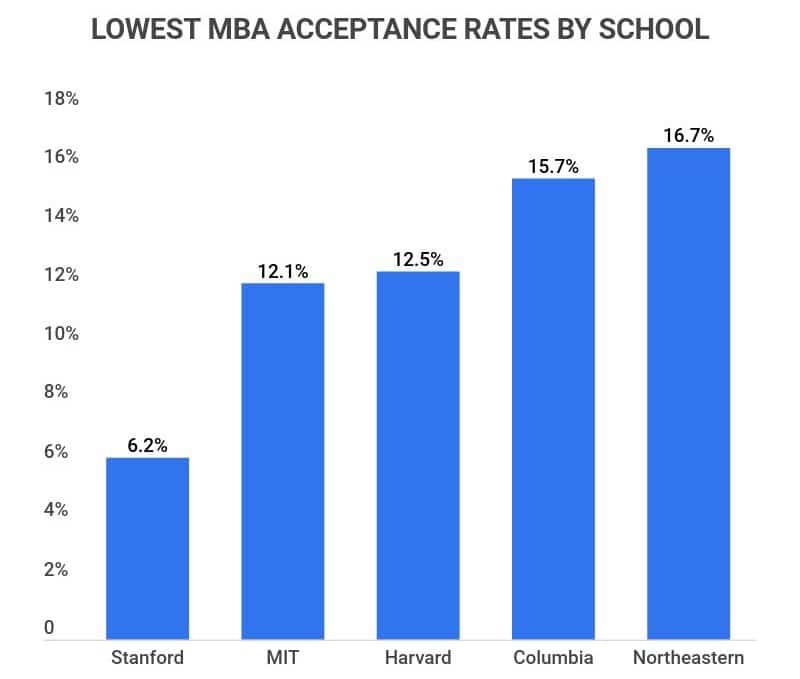
-
The average MBA program acceptance rate is 18.4% as of 2021.
While this is a bit skewed by private institutions like Stanford, which have remarkably low acceptance rates, MBA programs on the whole are highly competitive.
MBA Program Acceptance Over Time
Year Average acceptance rate Applications Admits 2021 18.4% 57,975 9,484 2020 22.3% 57,187 11,324 2019 19.7% 50,439 8,664 2018 17.2% 53,907 8,397 2017 16.0% 57,311 8,309 2016 14.5% 54,694 7,934 -
The MBA acceptance rate is currently 27% higher than it was in 2016.
MBA acceptance rates seem to be increasing over time, though they did hit an all-time peak in 2020.
MBA FAQ
-
How old is the average MBA student?
The average MBA student is 28 years old. With the middle 80% age range of MBA students being 25-31 years old. This is very consistent within all of the major US colleges, with most average ages ranging between 27-29 years old.
However, it is important to note that there are students outside of this age range. 16.4% of MBA students enter at age 25, and 12.5% enter at 30 or older.
-
How much does an MBA cost?
The average MBA costs $61,800. However, the range of costs can vary greatly, with MBA programs in the US costing anywhere from $30,000 to over $200,000.
In addition to tuition fees, it’s also important to consider other costs as well, such as housing or books. Textbooks, for example, cost MBA students between $1,000-$4,000.
-
How much does an MBA increase your salary?
Having an MBA degree increases your salary by an average of $36,742. This also depends significantly on the industry, with the top five biggest average increases coming from:
-
Consulting: +$46,414
-
Food, Beverage, and Tobacco: +$41,249
-
Investment Management: +$38,844
-
Private Equity: +$37,739
-
Technology, Internet, and Ecommerce: +$36,763
Differences in average salary increase highlight how important it is to research your career, as some careers might show meager salary increases that aren’t worth the cost of a degree.
-
-
How much do MBAs make in a lifetime?
The average MBA graduate makes $4,110,000 in their lifetime. More specifically, the top 10% of MBAs make $8,045,000 on average, and the top 50% make $5,655,000. All of this is considerably higher than those with Bachelor’s degrees, who will make an average of $3,320,000 over their lifetime.
-
What is the acceptance rate for an MBA program?
The average acceptance rate for all MBA programs is 18.4%. This also varies depending on the prestige of the institution, whether that institution is public or private, and whether the program is online or in-person.
For example, Stanford has the lowest MBA acceptance rate of 6.2%, while online MBA programs can have acceptance rates of 90% or higher.
-
What is a good GPA to get into an MBA program?
A good GPA to get into an MBA program is anything between 3.0 and 3.5. A GPA at this level can get you into many schools, even ones with acceptance rates as low as 20%-30%. However, you may need a GPA of 3.5 or higher to be admitted into elite schools like Harvard, Stanford, or Wharton.
Conclusion
Pursuing an MBA degree can be an exciting and reliable path toward furthering your career and raising your salary. However, knowing all of the facts before you apply is important.
The average MBA increases your annual earnings by over $36,000, and MBA graduates stand to earn an average salary of over $105,000 right after graduating. However, these impressive numbers do come with the downside of owing $75,000 or more in debt.
While this debt can be mitigated by earning your degree from an online program or public college, private schools like Stanford are renowned for a reason.
When in doubt, if you’re interested in pursuing an MBA, it’s important to analyze your career and finances, as well as perfect your application for those schools with lower acceptance rates.
References
-
U.S. News – 10 Business Schools With Lowest Acceptance Rates
-
U.S. News – Find MBAs That Lead to Employment, High Salaries
-
Transparent Career – How Much Does an MBA Increase Your Salary?
-
BusinessBecause – What Can Business Schools Do To Reduce The MBA Gender Pay Gap?
-
BusinessBecause – MIT Sloan Is World’s Most Expensive MBA Program In 2021
-
MBA Watch – Average Age & Work Experience At Top MBA Programs
-
Accepted – GMAT, GPA, and MBA Acceptance Rates: The Selectivity Index
-
MBA Watch – ‘The Window’ Closes: Acceptance Rates At The Top 50 U.S. MBA Programs
- Business Statistics
- Startup Statistics
- Cloud Adoption Statistics
- Customer Loyalty Statistics
- Nonprofit Statistics
- Affiliate Marketing Statistics
- Cart Abandonment Rate Statistics
- Ridesharing Statistics
- Call Center Statistics
- eLearning statistics
- Customer Service Statistics
- Customer Experience statistics
- Entrepreneur Statistics
- Outsourcing Statistics
- Gross Revenue for Marketing and Advertising
- Sales Statistics
- MBA Statistics
- Average Small Business Revenue + Profit Margin
- How Much Do Employee Benefits Cost?













